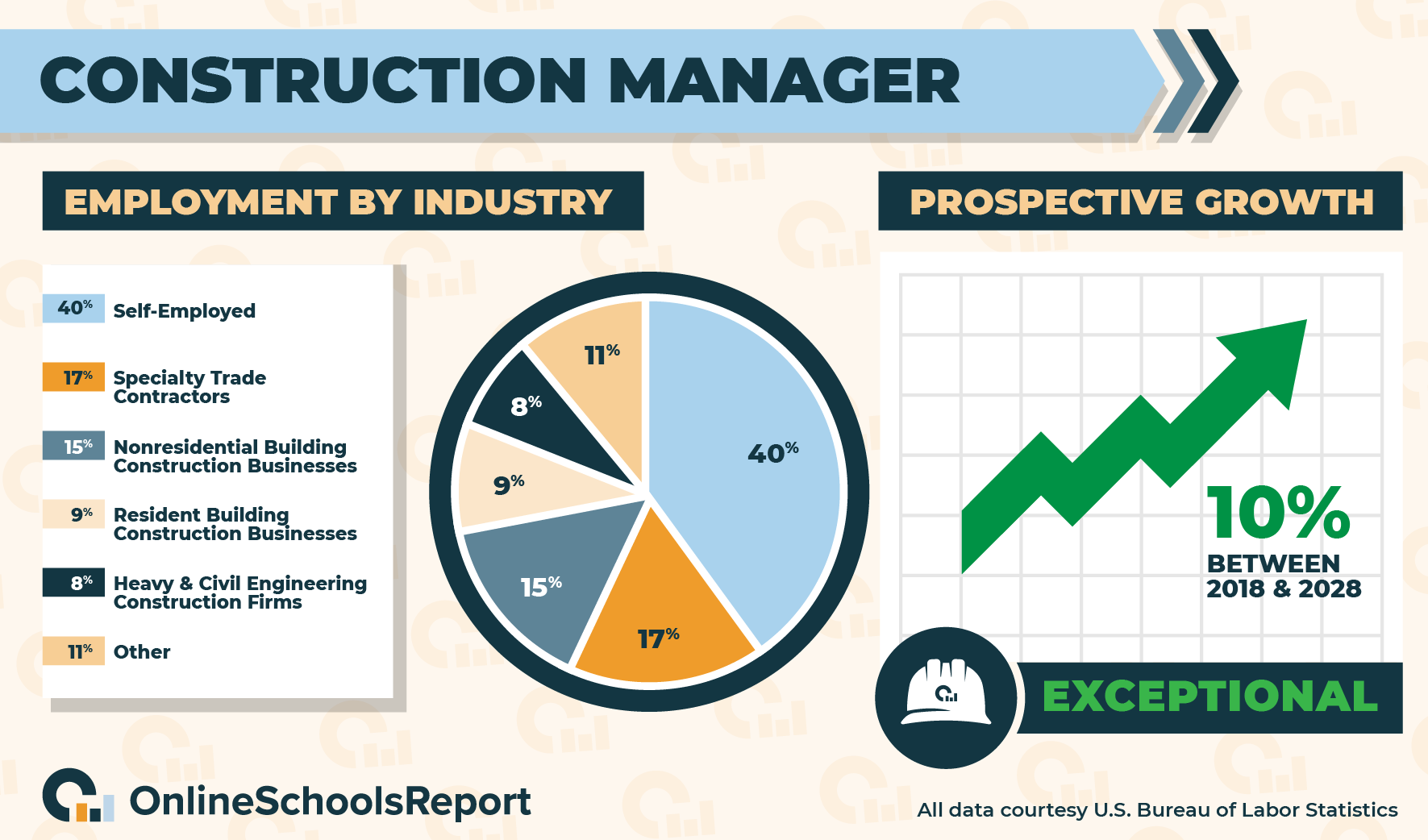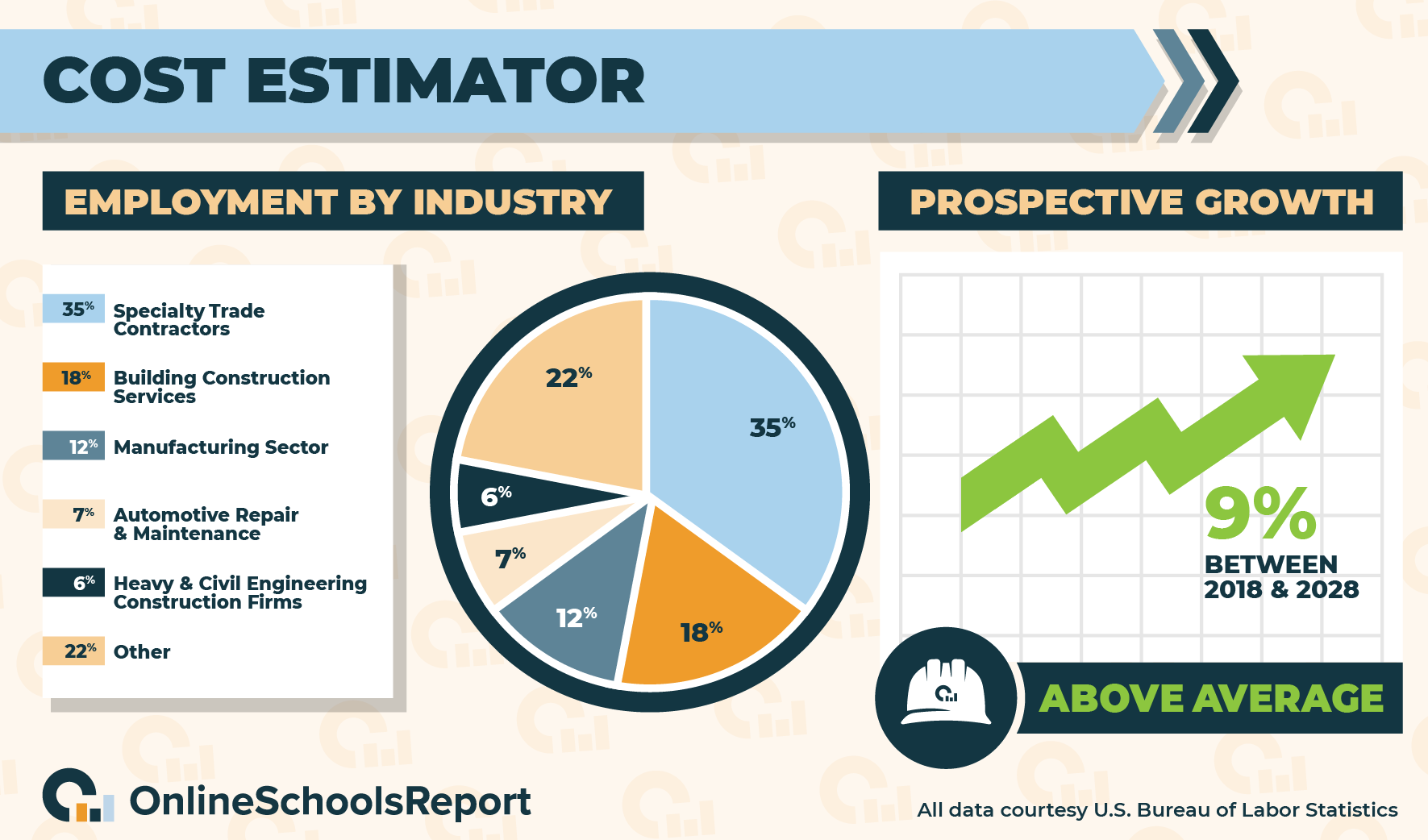You can build a lot of bridges with a construction management degree. Buildings, too. And you can make a pretty excellent salary while you’re at it. Plus, with a construction management position, you can work outside on dozens of different sites; forget about spending all day in an office. What’s not to love?
You probably want to know a bit more, though. Exactly how much do construction managers earn? What does the path to becoming a construction manager look like? Do you have to go to university? What about a graduate program? This article answers these questions, and a whole lot more.
We’re pretty sure that by the time you’re done reading, you’ll be convinced that building your future with a degree in construction management is the right choice for you.
What Is Construction Management

Part of the job of a construction manager is to help make cities look appealing and inviting to new companies and residents. But that’s not all a construction manager does.
From fulfilling massive private contracts with multinational corporations to building public housing complexes for communities in need, construction managers carry out many dynamic and essential duties.
Construction managers estimate costs and budgets for construction projects, act as the construction company liaison to help ensure that the project complies with building codes and other legal requirements, and collaborate with other construction specialists.
But that’s not everything. Construction managers also respond to work emergencies and delays. They also interpret contracts for clients and other professionals and select subcontractors for projects.
Isaiah Ram studies construction management at Georgia Tech, and although he didn’t go on to work in construction management, his company, Forming America, provides construction supplies to the industry.
Ram says a construction management degree helped him understand the industry, “so I could effectively understand the needs of contractors,” he says.
“Rather than going through a corporate store, or some novice,” Ram goes on, “we’re able to provide real value and relate to their needs. Construction workers appreciate this,” he says.
Clearly, construction managers have many duties. So how does a construction manager learn to balance all of their tasks?
Usually, the path to construction management begins with an undergraduate degree. While it’s possible to learn construction management in the field, large companies and clients prefer their construction managers to have a college education.
Construction management degrees are offered at the associate, bachelor’s degree, and master’s degree level. Earning a Ph.D. in construction management, though rare, is also possible. Many affordable construction management degrees are also offered online.
But no matter what degree path is chosen, aspiring construction managers must still undergo extensive on-the-job training, shadowing a veteran construction manager and their team while fulfilling, on occasion, the duties of a real-life construction manager.
Depending on the construction company, this training may take anywhere from two weeks to two years. But don’t let the extensive training intimidate you. You’ll be forever grateful for the lessons you learned as a trainee.
Another great way to learn the many facets of construction management is from certified instructors and experienced construction management professionals. Many of these professionals are members of the Construction Management Association of America, which offers their own educational programming and certification.
A degree in construction management can lead to other kinds of job besides just that of a construction manager. Up next are just a few of the many career paths opened up by a degree in this exciting field.
Careers in Construction Management
Here are just a few of the many exciting career paths opened up by a degree in construction management.
| Job Title | Approx. # Years of Education | Average Annual Salary |
| Construction Manager | 4 | $95,260 |
| Civil Engineer | 4 | $87,060 |
| Cost Estimator | 4 | $65,250 |
| Architect | 4 | $80,750 |
| Civil Engineering Technician | 2 | $53,410 |
All salary data is courtesy U.S. Bureau of Labor Statistics Occupational Outlook Handbook.
Construction Manager

Construction management is one of the largest and fastest-growing professions in the construction and design sector.
To be a successful construction manager, you must possess strong analytical skills, as well as business and customer service skills. Decision making, leadership, technical skills, writing, and time management abilities are also useful.
Tasks common for construction managers include preparing cost estimates, budgets, and work timetables. They may also interpret and explain contracts and technical information to other professionals, while reporting work progress and budget matters to clients.
Construction managers also collaborate with architects, engineers, and other construction specialists. Other duties can include selecting subcontractors while also scheduling and coordinating their activities to meet deadlines.
Ensuring compliance with legal requirements is another common responsibility of a construction manager, as well as building and safety codes, and other regulations
One of the most widely loved aspects of the profession is the flexibility that construction management allows, especially for self-employed construction managers. That said, construction managers are still known to work long, hard schedules. If you’re willing to make the commitment, though, you will be rewarded handsomely.
There are currently 471,800 construction managers in the United States, according to the Bureau of Labor Statistics, and that number is expected to grow by 10% in the decade spanning 2018–2028. This growth is faster than the national average.

Additionally, the Bureau of Labor Statistics states that 40% of construction managers are self-employed, 17% work for specialty trade contractors, 15% work for nonresident building construction companies, 9% work for resident building construction businesses, and 8% work for heavy and civil engineering construction companies.
States with high levels of employment in this profession include Texas and California, according to BLS data.
Construction managers are almost always required to hold a bachelor’s degree in construction management or a related field. Some construction managers obtain master’s degrees in construction management; few construction managers obtain doctorates in the field, though they do exist.
As we’ve stated, there’s also on-the-job training for construction managers, which can add anywhere from a couple of months to a couple of years to your formal education.
To learn more about the profession, a prominent trade organization for construction managers is the Construction Management Association of America (CMAA).
Civil Engineer

Sharing many similar duties with construction managers, civil engineers design, supervise, operate, conceive, construct, and maintain infrastructure projects. This can range from small private houses to massive public buildings, as well as dams, bridges, and water supply treatment systems.
On-the-job duties for civil engineers can include analyzing long-range plans. This can involve survey reports, maps, and other data used to plan and design a project.
Civil engineers must also consider construction costs, government regulations, potential environmental hazards, and other factors during the planning and risk-analysis stages of a project.
They may also compile and submit permit applications to local, state, and federal agencies, while verifying that a project complies with various regulations.
Other common duties for a civil engineer include the preparation of cost estimates for materials, equipment, or labor, while determining a project’s economic feasibility. They may also use design software to plan and design transportation systems, hydraulic systems, and structures in line with industry and government standards.
That’s while construction managers also perform or oversee surveying operations to establish building locations, site layouts, reference points, grades, and elevations to guide construction, while managing the repair, maintenance, and replacement of infrastructure.
There are roughly 326,000 civil engineer positions across the United States, according to the Bureau of Labor Statistics. The average annual salary is $87,060, and the profession is estimated to grow by 6% in the years spanning 2018–2028, which is the average rate of growth for the United States.

Also according to the Bureau of Labor Statistics, 49% of civil engineers work in engineering service firms. Additionally, 11% work for state governments, 10% work for local governments, 6% work for nonresidential building construction businesses, and 3% work for the federal government.
Given the wider breadth of work duties common to civil engineers as compared to those of construction managers, education requirements are also different.. Most civil engineers hold a bachelor’s in civil engineering, civil engineering technologies, or a related field like construction management.
Some states also require students to receive a professional engineer license (PE) to practice civil engineering. Each state issues its own license, but most states will recognize licensure from other states.
Cost Estimator

Cost estimators are valued professionals in almost every existing sector. As the job title suggests, they estimate the cost and time required to build a product or complete a service.
To assess costs, cost estimators identify and analyze multiple factors, often recommending ways to reduce costs while maintaining records of estimated and actual costs.
Cost estimators are also frequently charged with identifying factors affecting cost, such as production time, materials, and labor, while reading blueprints and technical documents in order to prepare accurate estimates.
Cost estimators commonly collaborate with engineers, architects, clients, and contractors, calculating, analyzing, and adjusting estimates while recommending other ways to save money and reduce costs.
Cost estimators also work with sales teams to prepare estimates and bids for clients.
According to the Bureau of Labor Statistics, the average annual salary of a cost estimator is $65,250, and the profession is expected to grow at a rate of 9% in the years ranging 2018–2028, which is faster than average for many other professions. There are around 218,000 jobs for cost estimators in the U.S.

The BLS also states that 35% of cost estimators work for specialty trade contractors. Additionally, 18% work for building construction services, 12% work in the manufacturing sector, 7% work in the automotive repair and maintenance field, and 6% work for heavy and civil engineering construction firms.
If you want to work for a construction firm as a cost estimator, consider an undergraduate degree in construction management or engineering, or a related field. Most cost estimators receive some form of on-the-job training, and a leading trade organization for cost estimators is the International Cost Estimating and Analysis Association (ICEAA).
Architect

The designers of the construction world, architects design houses, parks, buildings, airports, factories, and more. Look at any structure around you, and you can rest assured that an architect played a role in designing it.
Some specific duties of architects are to plan designs with clients, give estimates on costs and construction time, prepare scaled drawings, manage construction contracts, and inform clients of unexpected payments or changes in the schedule.
Architects usually employ computer-aided design and drafting (CADD) and building information modeling (BIM) software to plan designs and show them to clients and non-technical coworkers.
Other architects work with hand-drawn blueprints, but computer software knowledge is required for the profession. They may also be charged with seeking new work through marketing and giving presentations to prospective clients.
Architects usually work in offices, but they may observe building teams at construction sites to make sure construction workers are following the architect’s design.
According to the Bureau of Labor Statistics, an average architect’s salary is $80,750. The job is expected to grow at a rate of 8% in the decade spanning 2018–2028,
69% of architects work for architectural, engineering, and related services. Of the remaining 31%, 20% of architects are self-employed, 3% work for the government in some capacity, and 3% work for construction firms. Data from the BLS also states there are roughly 134,000 architecture positions available in the U.S.

Most architects who are not self-employed work full-time, and there are often additional work hours required when deadlines are near. Self-employed architects have more flexible work schedules and they often work from home.
The bare minimum requirement for a position in architecture is a bachelor’s degree in architecture, which takes around five years, which is one more year than most undergraduate programs. Many architects also earn master’s degrees in architecture or a related field like construction management to gain a greater understanding of the field and have a competitive advantage over other job applicants.
Most states require architects to complete a three-year internship before becoming eligible for the Architect Registration Examination. This exam grants architects the licensure to work anywhere in America. Some aspiring architects begin the three-year internship as students to expedite their career paths.
Civil Engineering Technician

Civil engineering technicians work alongside civil engineers every step of the way, assisting them in a broad range of land, commercial, residential, and industrial building projects. This can include traffic studies, bridge construction, land surveying, and much more.
In this crucial position on a construction team, civil engineering technicians often confer with civil engineers, so the ability to read and review project drawings and other plans is crucial, as well as the use of computer-aided design software.
Other common tasks for civil engineering technicians include evaluating the preconstruction field conditions, while also observing the project site to evaluate a contractor’s work. This helps ensure that project construction conforms to design specifications and applicable codes.
Civil engineering technicians may also test construction materials and soil samples in laboratories, and work to estimate costs and develop plans for both construction and operation. That’s while they also prepare reports and other documents involving project data and related project activities.
According to the Bureau of Labor Statistics, as of 2019, there are just under 74,000 civil engineering technician positions across the U.S., with an average salary of $53,410. Also according to the BLS, the profession is expected to grow at a rate of 5% in the decade spanning 2018–2028, a rate similar to many other careers.

An associate degree in construction management or a related field is often the minimum educational requirement to work as a civil engineering technician.
Data from the Bureau of Labor Statistics also states that 43% of all civil engineering technicians work in engineering services, while 28% work in state government. Following that, 16% work in local city government, and an additional 2% work in private construction.
Certification is not always required to work as a civil engineering technician, though it can improve employment opportunities and income potential. The most common certification for a civil engineering technician comes from the National Institute for Certification in Engineering Technologies (NICET).
Construction Management Degrees
Ready to begin your future in construction management? Start with any one of these exciting degrees.
Associate Degree in Construction Management

An associate degree (AA) in construction management from a community or junior college is a great starting point for those interested in working as a construction manager. This degree will enable graduates to work in an entry-level level position for a construction management team, or in a position such as a civil engineering technician.
An associate degree program in construction management will include general education classes as well as courses in construction management, such as strength of materials, cost estimation, college algebra, public speaking, and applied statistics.
Credits from most AA programs in construction management are also transferable to a four-year program. Finishing the first two years of a bachelor’s degree in this manner helps save time and money for those interested in continuing their education in construction management or a related field.
Gaining admission to an associate degree program first requires the completion of a GED or high school diploma, with a GPA of at least 2.0, though admission requirements vary. Some, but not all, associate degree programs may also require letters of recommendation, application essays, or the completion of admissions interviews.
Most associate programs take two years to complete. They consist of around 15 classes or 60 credits with a GPA of at least 2.0, but this can vary, as can the length of many programs.
Associate-level construction management programs can be found at many local community colleges, but not always. Commuting to a nearby city to find a dedicated construction management program may be necessary, but many complete their associate degree in construction management entirely online.
Bachelor’s Degree in Construction Management

A bachelor’s degree program (BS) in construction management is a typical starting point for those interested in working in the profession, and is also popular among associate degree program graduates.
Bachelor’s degree programs in construction management are most often offered at in-person four-year colleges and universities, but many affordable online programs exist as well.
Moving from the vocational emphasis of many AA programs, BS programs in construction management prepare graduates for leadership positions in the profession, or to continue their education in a master’s or even doctoral degree program.
These 120-credit programs mix general education, construction management, and elective requirements. Students can add minors if they wish, which can significantly benefit the student’s resume and knowledge base, helping increase employment opportunities and income potential.
Some common courses in a BS program in construction management include engineering economics, computer-aided engineering, construction materials and methods, and sustainable construction.
Admission requirements for many bachelor’s degree programs differ, with more demanding schools asking students for a 3.0 GPA or higher, as well as ACT and SAT test scores, letters of recommendation, admission essays, and admissions interviews.
Some schools ask students to have experience in construction, or to clearly demonstrate a dedication to working in the profession.
There are hundreds of undergraduate construction management programs around the country. You can find the best online programs on our list of The 5 Best Online Bachelor’s in Construction Management.
Master’s Degree in Construction Management

A master’s degree in construction management will prepare a graduate to work in a leadership position in the field, setting a job applicant apart from the competition while also granting access to better and higher-paying jobs.
Most master’s programs in this field take one year to complete, requiring anywhere from 36–54 semester credits of study, or 60–90 quarter-credits, but these requirements can vary. Common courses in a master’s degree program in construction management can include construction practices, construction business, project controls, and construction planning, among many others.
A bachelor’s degree is required to gain admission to a master’s degree program in construction management with a GPA of at least 3.0, though minimum GPA requirement can vary. The bachelor’s degree could also be in a related field, most commonly civil engineering, architecture, or engineering management, among others.
A GPA of at least 3.0 is required for admission to most master’s degree programs. Applicants may also be required to provide GRE or GMAT scores, as well as letters of recommendation, a professional resume, and a personal statement. Some work experience can also be helpful.
Many programs are designed to work around the schedule of a working professional, and a terminal thesis or project may also be a requirement for completion.
There are dozens of excellent master’s programs in the field of construction management. If you prefer on-campus learning, state schools and large private institutions usually have a graduate degree program in construction management, though they can be found online as well.
Doctorate Degree in Construction Management

Though rare and almost never required to apply for work in the field of construction management, doctoral degree programs in construction management do exist at a few select universities across the country.
These programs allow students to focus on a particular area of emphasis, such as sustainable construction, and enable graduates to go on to work in research or at the highest levels of government and education.
Other common coursework in a doctorate degree program in construction management can include construction management information systems and international project management, to name only a few.
Most often completed with between 60 and 120 course credits, doctoral programs can take up to eight years to complete, though most traditional coursework is finished in the first two years. The rest of the program is then spent researching, writing a terminal thesis, and working in the field.
Doctorate programs usually require students to have a solid GRE or GMAT score, official transcripts from an undergraduate program, a 3.0 or higher GPA, and a proven dedication to the profession, as detailed in a professional resume, letters of recommendation, or a statement of intent. But these requirements can vary.
Students in doctoral programs are also typically expected to have a specific research interest. That may be sustainable building, ocean engineering, or another concentration in the field.
Students must also complete and verbally defend a written dissertation to graduate.





